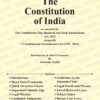THE DOWRY PROHIBITION ACT , 1961 BARE ACT ENGLISH EDITION 2025
| Binding | Hardbond |
|---|---|
| Edition | EDITION 2025 |
| Laguage | English |
| Publisher | WHITESMANN PUBLISHING |
| Publishing Year | 2025 |
₹90 Original price was: ₹90.₹72Current price is: ₹72.
₹395 Original price was: ₹395.₹316Current price is: ₹316.


₹325 Original price was: ₹325.₹260Current price is: ₹260.